Sports
/ArcaMax

Panthers' Matthew Tkachuk still mulling surgery decision with season two months away
MIAMI — Star winger Matthew Tkachuk still hasn’t decided if he’s going to have surgery to remedy a pair of injuries with the Florida Panthers just under two months away from beginning the 2025-26 NHL season and their quest for a third consecutive Stanley Cup.
Tkachuk told ESPN on Friday that he’s still weighing his options. However, if ...Read more

8/8 is for No. 88: Patrick Kane Day in Chicago is official. 'It's very special,' the Blackhawks great says.
CHICAGO — Patrick Kane is back — for a day, anyway. And now his name is part of Chicago lore forever.
Aug. 8 was always a day of celebration of the career of Kane for Blackhawks fans — after all, he donned the No. 88 sweater for 16 seasons with the franchise. The official recognition came Friday from Ald. Brian Hopkins, 2nd, who ...Read more
Panthers' Matthew Tkachuk to be featured as cover star of EA Sports' NHL 26
Matthew Tkachuk’s year just keeps getting better.
As if his second Stanley Cup wasn’t enough, on Wednesday, video game giant EA Sports revealed that none other than the Panthers star winger will grace the cover of their latest hockey title, NHL 26, which will be released on Sept. 12, 2025.
Tkachuk will be the lone athlete on the game’s ...Read more
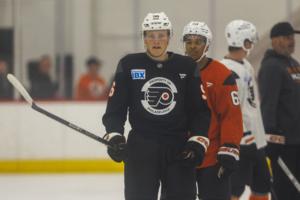
From rollerblading in California to college in the desert, Ty Murchison has taken a unique path to the Flyers
PHILADELPHIA — Ty Murchison rubbed out Jack Nesbitt along the wall during a drill on the first day of Flyers development camp earlier this month.
The 2021 fifth-rounder, who is 6-foot-2 and 205 pounds, made sure he did it with noticeable authority. And not just because he was taking out Nesbitt, the 6-5, 185-pound center who was drafted 12th ...Read more

Jason Mackey: Why a sale of the Penguins might -- or might not -- work
PITTSBURGH — It's the perfect — and percolating — Pittsburgh storyline, the possibility of Ron Burkle and Mario Lemieux repurchasing the Penguins.
News broke on June 11 that the group of Burkle, Lemieux and David Morehouse was considering trying to buy back the Penguins from the Fenway Sports Group, and I've since confirmed that interest ...Read more

Marcus Hayes: Carter Hart's acquittal doesn't mean he's innocent. But he could soon be employable. Should the Flyers consider it?
PHILADELPHIA — After a tortuous and sensational trial, Carter Hart and the four other members of Canada’s 2018 World Junior hockey team accused of sexually assaulting a woman in a hotel room after a Hockey Canada celebration in London, Ontario, were found not guilty Thursday.
Not innocent. Just not guilty. And resoundingly so.
Justice ...Read more
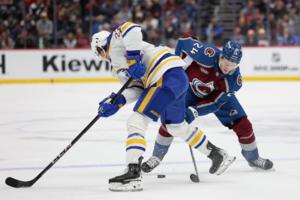
Avalanche trade 2021 first-round pick Oskar Olausson to Sharks
DENVER — The Colorado Avalanche are moving on from Oskar Olausson.
The Avs sent the 2021 first-round pick to San Jose in a trade that brought back two-way forward Danil Gushchin, the team announced on Friday afternoon.
Olausson never found his footing at the NHL level, appearing in just four games total with the Avs after being selected with...Read more

Former Flyers goalie Carter Hart found not guilty in Hockey Canada sexual assault case
Carter Hart will not face prison time after Justice Maria Carroccia found the former Flyers goaltender not guilty on the count of sexual assault.
According to media outlets present at the Ontario Superior Court house in London, Ontario, Carroccia started announcing her decision Thursday by saying: “Having found that I cannot rely upon the ...Read more

Ken Sugiura: The Stanley Cup in Atlanta: Great thing happens to a good person
ATLANTA — Before we get into the story of the first day that the Stanley Cup ever spent in Atlanta as the guest of an NHL championship team member, it’s important to know a little bit about the cup itself.
Quite arguably, it is the greatest and most tradition-bound trophy in North American sports. First awarded in 1893, Lord Stanley’s Cup...Read more
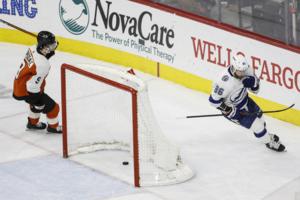
Ten things to know about the NHL's new collective bargaining agreement
PHILADELPHIA — Last week, the National Hockey League and the NHL Players’ Association ratified a new four-year collective bargaining agreement that will commence with the 2026-27 season and run through 2030.
The deal, which was agreed to a full year before the current CBA expires next July, notably came together rather smoothly and with ...Read more
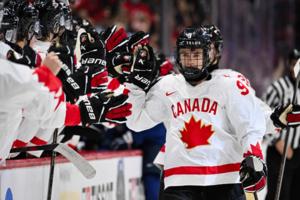
Jason Mackey: Embracing the tank for Penn State's Gavin McKenna would be the ultimate Penguins move
PITTSBURGH — Three bits of news in seven days, two likely involving the NHL club, and one gigantic question surrounding the Penguins: Why not orient everything they do in 2025-26 toward the idea of hopefully obtaining teenage phenom Gavin McKenna?
Answer: It appears that's exactly what they're doing, even if you won't hear the franchise talk ...Read more
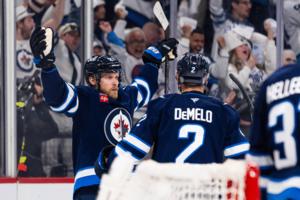
Luke DeCock: Inside the emotional highs and lows as Hurricanes worked to add Miller, Ehlers
RALEIGH, N.C. — Nikolaj Ehlers put the whole players-don’t-want-to-play-here narrative perpetuated by the summary departures of Jake Guentzel and Mikko Rantanen quickly to rest by taking less money to sign with the Carolina Hurricanes.
That was actually the least of what the arrival of the skilled Danish winger did for the Hurricanes last ...Read more
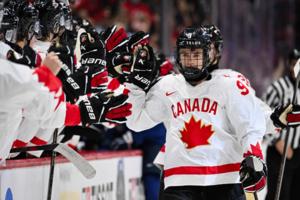
Report: Gavin McKenna, the projected No. 1 pick in the 2026 NHL draft, commits to Penn State
PHILADELPHIA — Penn State knows a thing or two about landing a top recruit. From Derrick Williams to Christian Hackenberg to Miles Sanders to Micah Parsons, the Nittany Lions have landed their fair share of blue-chippers through the years.
Gavin McKenna might be bigger than them all.
But you won’t find McKenna’s name scrolling through ...Read more
Extensions give Panthers defined window to contend. Are they also a gamble?
MIAMI — The Florida Panthers have established a defined window to continue contending for Stanley Cups.
Florida has 10 players from its core — forwards Aleksander Barkov, Matthew Tkachuk, Sam Reinhart, Sam Bennett, Carter Verhaeghe, Anton Lundell and Brad Marchand plus defensemen Aaron Ekblad, Gustav Forsling and Seth Jones — all signed ...Read more

La Velle E. Neal III: Minnesota Wild leader Bill Guerin, money in his pocket, remains set up to strike. Think trade deadline.
MINNEAPOLIS — We all had our shopping lists ready as July 1 approached. NHL free agency was near, and Wild President of Hockey Operations Bill Guerin was finally in position to show how he can shape a roster with no salary limitations.
It has been difficult to assess Guerin’s tenure with the Wild since July 2021, when he bought out the ...Read more
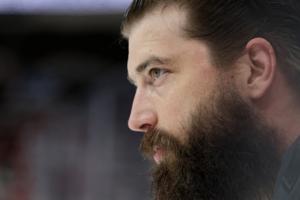
New Avalanche defenseman Brent Burns has 'one big goal still' after remarkable career -- win the Stanley Cup
DENVER — Brent Burns has lived a full hockey life.
He’s won international tournaments. He’s won the Norris Trophy. He’s been a guest star on one of his favorite television shows. He’s appeared on the cover of a sports magazine in his birthday suit.
He will almost certainly have a plaque in the Great Hall someday at the Hockey Hall of...Read more

Blackhawks' top pick Anton Frondell had to recover mentally from a knee injury to improve his game
CHICAGO — Big-time players are expected to show up in big-time games, and Chicago Blackhawks forward prospect Anton Frondell is the first to admit that he didn’t.
Tournaments such as the IIHF Under-18 World Championship in Frisco, Texas, in May are the kind of showcase where top prospects like Frondell cement their elite status — a ...Read more
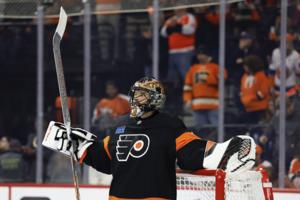
Marcus Hayes: The Flyers have a real goalie tandem again after free agency, as the Carter Hart door closes
PHILADELPHIA — The Flyers signed Dan Vladar when free agency began Tuesday. A third-round pick of the Bruins in 2015, the Czechia native, who turns 28 next month, just completed his fifth season of an unremarkable career that jump-started when Tuukka Rask left the COVID playoff bubble in 2020 to tend to his sick daughter.
Vladar’s save ...Read more
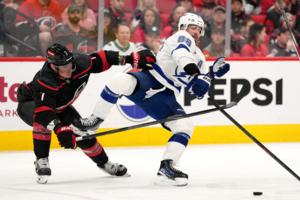
Sharks hope that additions to blue line help solve two issues
SAN JOSE, Calif. — The San Jose Sharks hoped they accomplished two things at once Thursday when they added veterans Dmitry Orlov and Nick Leddy to their revamped roster: addressing the shortcomings on defense and increasing the competition for ice time on a suddenly crowded blue line.
The Sharks continued what’s been a busy week as they ...Read more
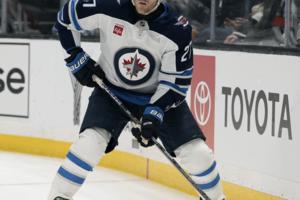
Hurricanes sign forward Nikolaj Ehlers to 6-year contract
RALEIGH, N.C. — It took a few extra days, adding to the suspense, but for the Carolina Hurricanes it was worth the wait.
The Canes on Thursday signed free-agent forward Nikolaj Ehlers, a proven point-producer they believe can bolster the lineup and help them better contend for a Stanley Cup.
Ehlers agreed on a six-year contract that will pay...Read more
Popular Stories
- Panthers' Matthew Tkachuk still mulling surgery decision with season two months away
- 8/8 is for No. 88: Patrick Kane Day in Chicago is official. 'It's very special,' the Blackhawks great says.
- Panthers' Matthew Tkachuk to be featured as cover star of EA Sports' NHL 26
- Marcus Hayes: The Flyers have a real goalie tandem again after free agency, as the Carter Hart door closes
- Mac Engel: Stars bringing back a familiar name as head coach is a no-win situation





